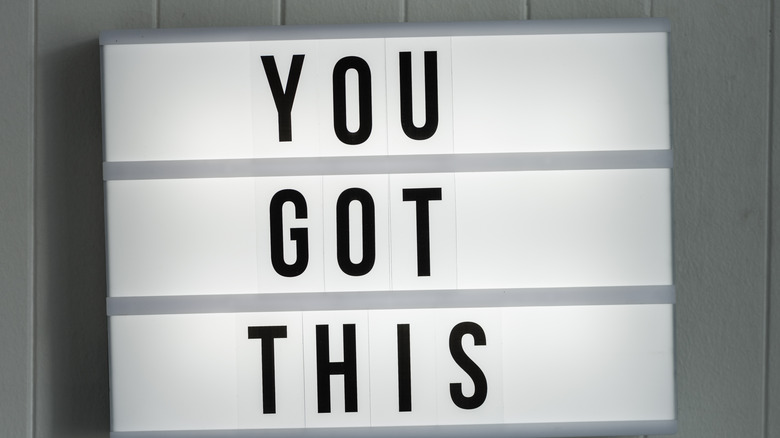The First Thing You Should Do When You Have A Panic Attack
Panic attacks can be terrifying, but you can take action. According to the Cleveland Clinic, panic attacks are intense and sudden feelings of fear and anxiety that occur in nonthreatening situations. Physical signs of a panic attack may include a racing heart and excessive sweating. A panic attack can happen to anyone, though individuals with substance abuse problems, mental health disorders, and a family history of anxiety are more at risk. WebMD states that as many as one in 10 adults experience at least one panic attack a year. And as many as one-third of the U.S. population will experience at least one panic attack throughout their lifetime.
There are a few things you can do, both physically and mentally, to stop or mitigate a panic attack. The first thing you can do is remind yourself that the uncomfortable symptoms and irrational sense of fear will pass, notes Medical News Today. While you're doing this, focus on your breathing. Keep your attention on your breathing as you slow your breaths and try the proven stress-relief technique of counting while you breath in for four seconds, hold it for seven seconds, and slowly exhale for eight seconds.
Positive affirmations can help you take control
If you find panic-relieving breathing techniques to be ineffective, the power of positive affirmation could be just what you need when you feel a panic attack is coming. Verywell Mind recommends silently repeating positive mantras to yourself such as "I am in control of my anxiety," "This will pass," "I am a worthwhile person with a lot of great qualities," or "I am stronger than my panic attacks."
If you have frequent attacks, you may want to carry around an index card in your bag or have a note in your phone to look at a visual, written reminder of encouragement. Specifically, write a note to yourself ahead of time that says panic attacks are not life-threatening, Dr. Carolyn Rodriguez, an assistant professor of psychiatry and behavioral sciences at Stanford, tells NBC News. "And maybe add the note to yourself, 'You have survived panic attacks before. You will survive this one,'" she also suggests. Panic attacks can be terrifying. Luckily, you can regain some control by using the response techniques listed above.
If you or someone you know is struggling with mental health, please contact the Crisis Text Line by texting HOME to 741741, call the National Alliance on Mental Illness helpline at 1-800-950-NAMI (6264), or visit the National Institute of Mental Health website.


